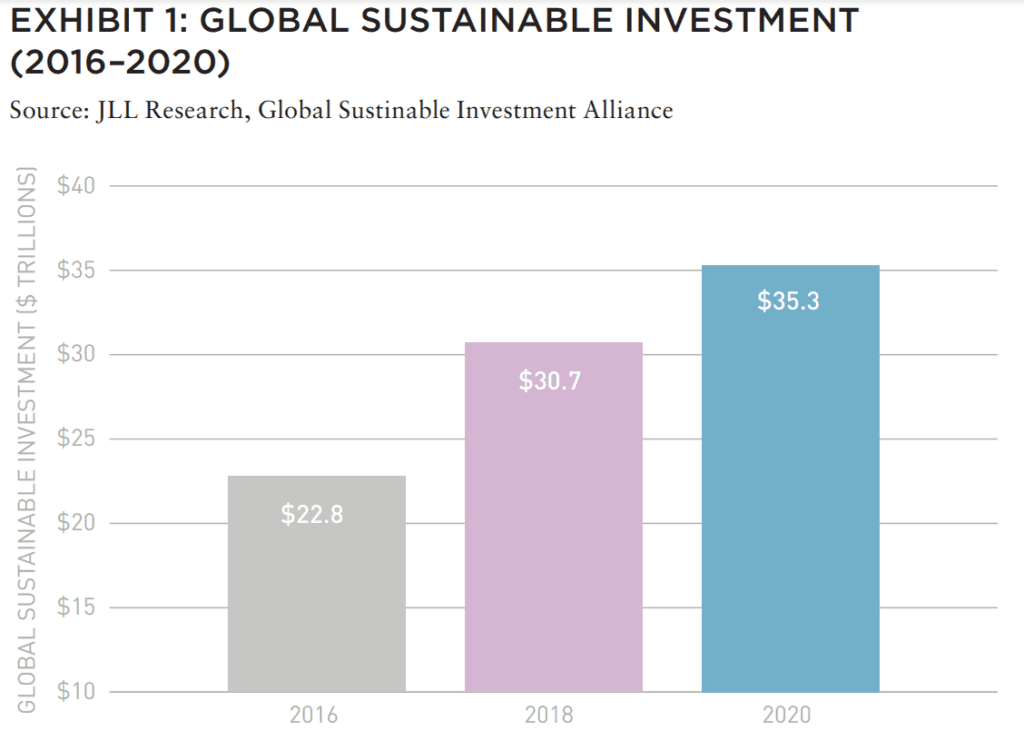As a labor-intensive and service-oriented asset class, hospitality is uniquely positioned to be a leader in advancing sustainability goals for investors.
The pandemic has caused a reckoning of sorts and has demonstrated the importance of embracing more environmentally friendly and socially responsible governmental policies and business practices. As active influencers of the world we live in, corporations and governments are being pressured to contribute and more aggressively advance their efforts in creating a sustainable, healthy, and just world.
Environmental, social and corporate governance (ESG) standards have evolved beyond corporate statements into the actual demonstration of action and proof of positive results. The hospitality industry is amid one of the most profoundly transformative periods of its history, as it continues to recover from the most dramatic drop in performance brought on by COVID-19. At this moment in time, the hospitality industry is uniquely positioned to be a leader in advancing sustainability goals as hotels are a labor-intensive and service-oriented asset class that relies heavily on workers, utilities, water, energy, and waste elimination processes.
Environmental, social and corporate governance (ESG) standards have evolved beyond corporate statements into the actual demonstration of action and proof of positive results. The hospitality industry is amid one of the most profoundly transformative periods of its history, as it continues to recover from the most dramatic drop in performance brought on by COVID-19. At this moment in time, the hospitality industry is uniquely positioned to be a leader in advancing sustainability goals as hotels are a labor-intensive and service-oriented asset class that relies heavily on workers, utilities, water, energy, and waste elimination processes.
COVID-19 accelerated and brought to the forefront the important and urgent changes the industry needs to prioritize. With the lessons learned, the industry can play a critical role advancing impactful environmental and social considerations.
OPERATIONAL EFFICIENCIES
Prioritizing efforts that lower the industry’s carbon footprint and reduce climate risk will be imperative in managing operational costs and, more importantly, in helping protect communities and the environment.
Hotels are income-generating properties, and income is affected by both revenue and expense. Enhancement of the former and containment of the latter maximize value.
Utilities tend to range between two and five percent of gross operating revenue. Adding energy-efficient systems is one of the best ways to reduce overall costs. For example, a one-percent reduction in energy costs for a property with US$20 million in revenue results in a savings of $200,000. Applying a direct capitalization rate of 8% translates to US$2.5 million in value. This increase does not include the likely reduction in maintenance and replacement costs, which will surely add to the bottom line.
Maximizing operational efficiency is the first step toward netzero carbon emissions. Retrofitting existing buildings, whenever possible, will be essential to meet market demand for net-zero carbon space and is considered the responsible course of action. For the lodging industry, the implementation of even the simplest sustainable measures (e.g., LED lighting, smart thermostats, etc.) have the potential to reduce utility costs of up to 40% and the installation of solar panels can reduce energy costs even further.
EMPLOYEE RETENTION
Workforce turnover is one of the costliest hotel expenses. Reducing turnover would undeniably enhance productivity and efficiency by reducing the need to hire temporary staff and providing training for new employees.
This is an area in which hoteliers are uniquely positioned to make an impact and should go beyond improved compensation by providing:
- Safer working conditions
- Robust career and upward mobility opportunities
- Cross-training programs to allow employees to learn new aspects of running a hotel
- Flexible work arrangements and schedules
- Advance pay options for employees
Satisfied and well-trained employees provide better customer service, which promotes repeat stays and increased recommendations.
INVESTOR APPETITE
Appetite for ESG focused investments is on the rise. In fact, JLL Research shows that institutional investors comprise 75% of global ESG investment, and the size of the global ESG investment market is growing. According to Global Sustainable Investment Alliance’s 2020 Global Sustainable Investment Review (Global Sustainable Investment Alliance, 2020), between 2016 and 2018, global sustainable investment grew 34% to US$30.7 trillion. From 2018 to 2020, it grew an additional 15% to $35.3 trillion. As such, by the end of 2020, the number of ESG assets under management was 35.9%, a noted increase from the 27.9 percent reported at the end of 2016.
For the right product and market, competition will surely drive value.
SOCIAL IMPLICATIONS
For hotels, transitioning to lower carbon footprint will also support the health and wellness of the surrounding communities, as research shows, cutting emissions can bring with it large health co-benefits for surrounding communities. In addition, positive social impacts can be achieved through programs that benefit upskilling, training, or living wage projects. Increased social value can also be reached by responsible procurement, supplier diversity, community engagement and a focus on the health and wellness of its employees and the community at large.
GOVERNANCE
Governance involves a set of protocols and standards that support the greater goals of balancing people, planet, and profit, including ethics, corporate culture, internal controls, and data security. Most established businesses have best practices supporting governance of operations and assets; however, moving forward, businesses will need to focus on best practices that advance corporate responsibilities beyond achieving profit targets. As an example, Marriott has created different committees with a specific focus, including diversity, social impact, and governance. Each of these committees ensures Marriott is working towards accomplishing its goals. Hilton hires an independent third-party company to verify that the figures it reports on carbon, water, and waste consumption are accurate.
COMPANIES TAKING THE LEAD
Hilton is committed to cutting emissions 61% by 2030 and is taking crucial steps to increase sourcing renewable energy at its hotels around the world. Between 2008 and 2018, Hilton reduced its carbon emissions intensity by 34%, waste intensity by 41%, energy use intensity by 24% and water use intensity by 20%, delivering more than $1 billion in operating efficiencies. In 2020, the hotel parent brand company took one step further and began sourcing 100% renewable electricity at the majority of its managed hotels in the UK and added renewable energy options for US managed hotels. Currently, 100% of its hotels are being mapped against climate risks.
IHG Hotels & Resorts launched a new program to tackle environmental, social, and overall ESG goals titled, “Journey to Tomorrow.” The series of commitments aims to make a positive difference to people, communities, and the planet over the next decade. It also launched “IHG Green Engagement,” which enables the brand to set and track property-specific reduction goals for carbon, energy, water, and waste. In 2021, IHG saw a 12% reduction in total global carbon emissions compared to 2019, albeit this was largely due to lower occupancy levels across its hotels.
In Marriott’s 2021 Serve 360 Report presenting data from 2020 and demonstrating its ESG efforts, the company announced that it is committed to reducing carbon intensity 30% and water intensity by 15% by 2025. In fact, Marriott is slightly ahead of schedule in its carbon intensity reduction and reduced its intensity by 32% relative to its 2016 baseline in 2020. Further, Marriott has 184 open adaptive reuse hotels, with a goal of having 250 by 2025.
LOOKING FORWARD
ESG for hotels is a tremendous opportunity to drive revenue and reduce overall expenses while setting the hotel apart from the competition, building a loyal customer base, helping the environment, and promoting social responsibility.
Retrofitting existing building stock, whenever possible, will be essential to meet market demand for net-zero carbon space and is considered the responsible course of action.
To meet these demands, increased capital investment will be needed to convert an asset, implement social programming, and/ or execute stronger governance protocols. While some programs will provide an immediate and long-term impact, others will be indirect.
However, the reality is that there is still a great deal to learn, as stronger evidence of actual transactions to quantify the impact of ESG is still trickling in.
Awareness is the first step.
—
ABOUT THE AUTHORS
Charlotte Kang is National Hotel Practice Group Leader, Valuation Advisory for JLL. Geraldine Guichardo is Global Head of Research, Hotels and Director, Americas Living Research for JLL. Lori Mabardi is the Global ESG and Sustainability Research Director for JLL. Emily Chadwick is Lead Risk Advisor – ESG, Valuation Advisory for JLL. JLL has committed to being Net Zero Carbon by 2040 and to supporting clients on their journey to a low carbon world.
—
EXPLORE THE FULL ISSUE (SPRING 2022)

MARCHING BACKWARDS INTO THE FUTURE
The new 2022 AFIRE International Investor Survey Report reveals future institutional investment trends as the pandemic transformed how we live, work, and play.
Gunnar Branson and Benjamin van Loon | AFIRE
CITIES THAT WORK
What is it that makes London, Stockholm, Berlin, Amsterdam, and Paris the top European cities for office investment? And what could this mean for other global cities?
Dr. Megan Walters | Allianz Real Estate
SURVEY SURFEIT
Be careful about advice you hear from surveys— it will not always play out as expected.
Jim Costello | MSCI Real Estate
NEW WORKING AGE
Outside of WWI and II, the US working age population has never declined. As of 2021, that statement is no longer true.
Stewart Rubin and Dakota Firenze | New York Life Real Estate Investors
SELECTIVE FRAMEWORK
Two years after offices closed due to the COVID pandemic, the debate over the longterm future of the office continues. What should office investment look like going forward?
Dags Chen, CFA; Ryan Ma, CFA; and Ryan LaRue | Barings Real Estate
GARDEN VIEW
US garden apartment investments are offering outsized return potential –but access remains a challenge.
Martha Peyton, PhD | Aegon Asset Management
SINGLE-FAMILY DEMAND
As an increasingly popular asset class for institutional investors, single-family rentals are supported by strong future demand drivers to propel sector outperformance.
Daniel Manware | Nuveen Real Estate
ESSENTIAL HOUSING
The US is in the middle of one of the biggest housing crises that the country has ever seen. It needs a more resilient approach to housing.
Todd Williams | Grubb Properties
LODGING TAKES THE LEAD
As a labor-intensive and service oriented asset class, hospitality is uniquely positioned to be a leader in advancing sustainability goals for investors.
Charlotte Kang, Geraldine Guichardo, Lori Mabardi, and Emily Chadwick | JLL
CARRY ON, CARRY OVER
While continuation vehicles were once viewed as a signal of delay or failure, market sentiment is rapidly changing.
Max LaVictoire and Ashley Anderson | Hodes Weill & Associates
RENEWING ETHICS
A note from AFIRE’s Ethics Chair on the need for maximizing ethics in an age where globalization is under threat.
El Rosenheim | Profimex



